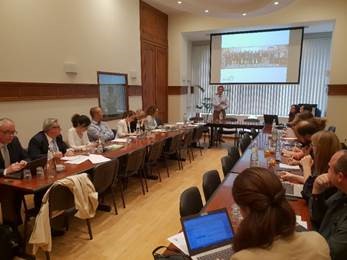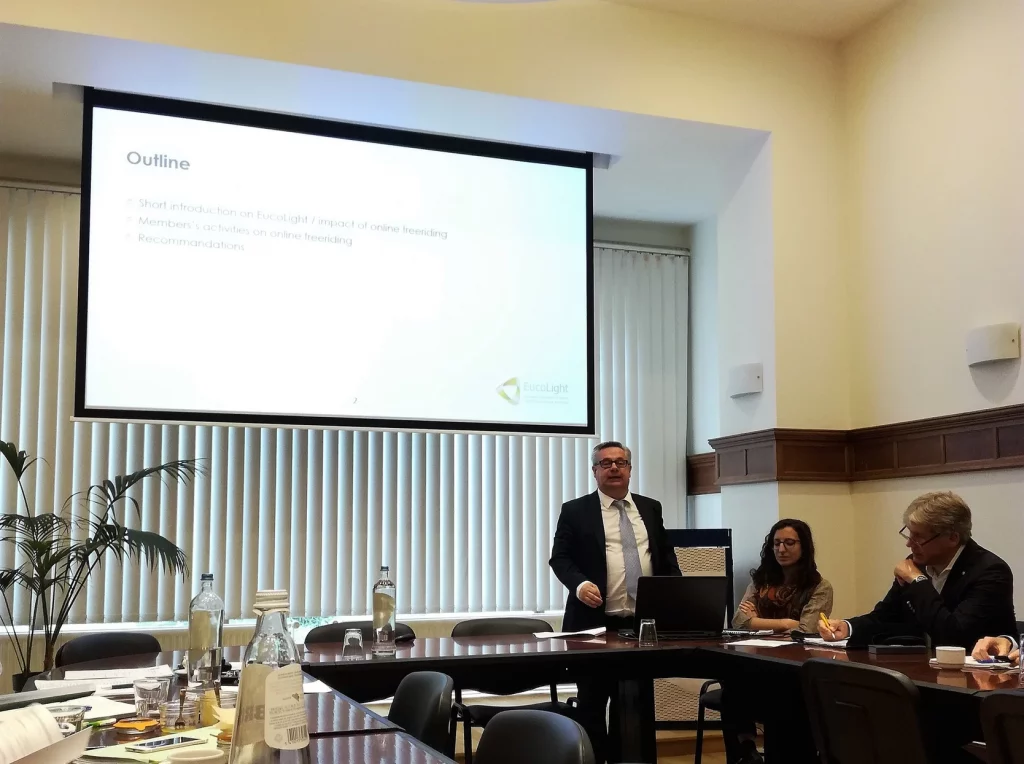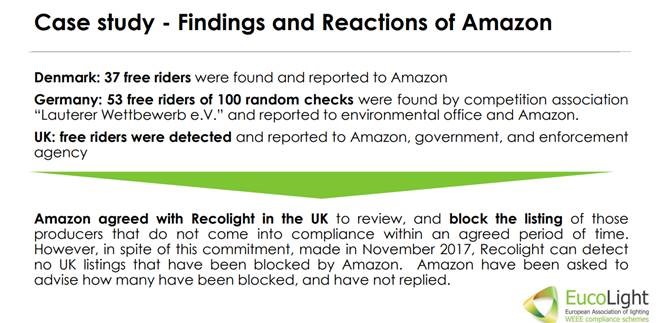

Representatives from EPR organisations, the European Commission, online platforms and Member States met to discuss possible solutions to the problem of EPR non-compliance on online sales in an EPR Club lunch debate hosted by EucoLight, EXPRA and WEEE Forum.
When EPR was introduced nearly 30 years ago, practically all of the products under EPR were sold by retail stores with a small part of specialised catalogue distance sellers existing. Already in these days in the 1990s, this sector had a lower compliance than other sectors with local retailers. With the success of internet trade which enables the (private and commercial) consumer to buy directly at a seller without visiting a stationary trade, more and more goods under EPR are sold via this distribution channel, often with a seller outside the jurisdiction where the user has its seat, or even outside the European Union. This has been boosted by the success of trading platforms like eBay, Amazon, etc. which makes it extremely easy for a consumer to find his seller of preference. The OECD has seen a growth in business in internet trade from 2014 to 2017 by over 60% in 8 major EU economies (150 to 230 billion €).
Even more than before, this sector is not very compliant with EPR obligations (but also with VAT and other tax obligations) which leads to an increasing amount of free riding in national EPR systems. Free riding is also leading to an increased burden for those companies who are complying with their obligations, meaning that they have to pay indirectly the fees of the free riders as well. For the WEEE sector, the non-store EEE retail in the EU is thought to be >30% of the market so that the problem has reached a point where the competent authorities but also the value chain, including the selling platforms / fulfilment houses, have to take action to avoid the collapsing of the first EPR system.
The new Waste Framework Directive has recognized this challenge by setting out the minimum requirements for EPR schemes (Article 8a), also especially for this distance selling sector:
“Member States shall establish an adequate monitoring and enforcement framework with a view to ensuring that the producers of products and organisations implementing extended producer responsibility obligations on behalf of producers, implement their extended producer responsibility obligations, including in the case of distance sales, the financial means are properly used and all actors involved in the implementation of the schemes report reliable data.”
The OECD has conducted research on the matter and recently issued its report. EucoLight and the WEEE Forum hosted a conference on this topic in Brussels on 13 September 2017. Half a year after that conference, a workshop on 7 May 2018 in Pyrgos, Cyprus, brought new opportunities to take stock of progress made, collected data and intelligence, identified good practices for both Member States and compliance schemes, and, most importantly, learned from each other what we can do collectively in joint initiatives.
The EPR Club Lunch Debate – hosted by the WEEE Forum, EucoLight and EXPRA – representing 3 important product streams under EPR – followed up all these efforts to discuss the current situation, the discussed solutions and possible next steps with all relevant EU stakeholders.
Around 25 representatives from various companies, authorities and associations participated in this debate which was moderated by EXPRA’s MD Joachim Quoden, inter alia 3 persons from the European Commission, AMAZON, EUROPEN, the Belgium Packaging Commission, the WEEE Forum and EucoLight as well as the EXPRA members the Belgium PRO Fost Plus and the Norwegian PRO Green Dot Norway.
Pascal Leroy, Secretary General of the WEEE Forum, introduced into the topic and gave also some basic recommendations.

Marc Guiraud from EucoLight highlighted some case studies of his members, especially:

The representative from the Belgium Packaging Commission explained the limits of an authority especially if and when companies are delivering goods from outside Belgium and especially from outside the EU into the Belgium market.
The Commission representatives highlighted that they somehow did already their part on the European level and that Member States have to now introduce the specific measures to ensure that enforcement takes care about all obliged companies whatever distribution channel they are using. Nevertheless, they recognize the growing challenge and agreed to further dig into the topics especially when they meet with the representatives of the Member States in their regular meetings.
The representative of AMAZON also admitted the growing concern of his company when acting as a selling platform that no all users of the platform are in compliance with the various laws, inter alia EPR but also taxation legislation. He explained that they have introduced a dedicated communication towards their clients and that they will also seek for collaboration with their competitors. He informed that a respective meeting with their main competitors will take place in London during the next weeks, under the moderation of the British authority DEFRA.
The discussion also showed that the various implementation in the 28 Member States with varying formalities, varying reporting, different fee structures are not helpful to make it easy for small and medium sellers to comply with national EPR obligations. Also, the “authorized representative” model, being a feasible solution for foreign importers first hand, seems to be not very practical as also complicated and especially expensive solution.
From a PRO point of view, it would be very purposeful to amend the “obligated producer” in such a way that a platform becomes automatically “producer” if they sell goods under EPR obligations from non-compliant companies.
At the end of the debate, the participants concluded that it would be the best if the Commission invites EPR organizations to one of the next meetings with representatives of the Member States, if AMAZON speaks to the other internet platforms to promote the idea of a common working group with EPR organizations, inter alia to establish a harmonized procedure for questionable cases, if the VAT registration and the EPR registration is linked and if the EPR organizations develop a common communication explaining the EPR obligations for companies and how they can be fulfilled that can be used by all platforms and that could be distributed by the Chambers of Commerce in various countries, available in the most important languages.

